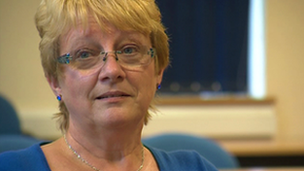Kirsty Jones Thailand murder DNA 'breakthrough' hope
- Published
Kirsty Jones was travelling around the world after graduating from university
Police investigating the murder of a woman in Thailand 13 years ago say DNA advances and fresh interviews with witnesses could provide a breakthrough.
Kirsty Jones, 23, from Tredomen, near Brecon, was raped and strangled at a guesthouse in Chiang Mai in 2000.
Dyfed-Powys Police said they had been given permission to forensically review evidence collected by Thai officers.
Ms Jones's mother Sue said she was confident the case could be solved because of scientific improvements.
Her Liverpool University graduate daughter was killed in the city in northern Thailand just three months into a two-year trip around the world.
Since then, Mrs Jones has worked tirelessly to ensure that her daughter's murderer is brought to justice, even travelling to the south east Asian country with Welsh officers last year to publicise a £10,000 reward for information.
But despite numerous appeals the killer remains on the loose.
'Positive steps'
Dyfed-Powys Police officers, who have been supporting and liaising with the Thai authorities on the case, announced key updates on the investigation as the family prepared to mark the 13th anniversary of the murder on Saturday.
Det Supt Andy John, leading inquiries for the Welsh force, said they had been given permission to carry out a forensic review of evidence collected by Thai officers.
They have also been given access to all the documentation held by the Thai authorities on the case for the first time.
Meanwhile police from Thailand's Department of Special Investigation (DSI) are aiming to travel to the UK to re-interview witnesses who were in Chiang Mai at the time of the murder.
"They are British nationals who are now back in the UK and we believe there's value to interview them again," said Det Supt John.
"As time has moved on and now they're resident in the UK they might feel more comfortable and confident sharing information they didn't before.

Det Supt Andy John said the number of people going on the Thai DNA database is growing
"These are three positive steps and it demonstrates the Thai police's commitment to trying to solve the case."
Police have a DNA profile of the suspect or somebody who helped them - the indications are that it was a person of south east Asian origin.
Dyfed-Powys Police and Ms Jones's family believe developments in the Thai DNA process could also lead to a breakthrough.
"The DNA process in Thailand isn't as advanced as in the UK but it is growing," said Det Supt John.
"The number of people going on the DNA database in Thailand is growing. They have also taken DNA samples from prison inmates with certain convictions. That's ongoing."
'Unanswered questions'
Last September Thai police accepted an offer of assistance from Dyfed-Powys Police, in particular with forensic tests.
Officers later came back to the UK with samples from the murder scene, including the sarong that was used to strangle the farmer's daughter.

Sue Jones said she believes advances in forensic science could lead to a breakthrough
However, the £10,000 reward has so far not provided any new leads, Det Supt John added.
"We were fairly disappointed with the response we had to that appeal," he said.
"But we felt it was still valuable to ensure it was at the forefront of the media in Thailand."
Despite the difficulty of fighting for justice in a country on the other side of the world, Mrs Jones said she would never give up trying to find out what happened to her "fun loving, happy, exuberant" daughter.
"It's brilliant if they [police] can have access to certain things and do more forensics on them because I can say forensics are improving every day and you never know, they just might find the one thing that they need," she said.
"It's a detectable case. It's just a matter of keeping on plodding on and hoping that we get the end result."
She added: "I don't suppose I ever will know why, but as her mother I believe that there remain many unanswered questions and stages of the investigation that need to be followed up and thoroughly investigated by the Thai authorities."
- Published9 August 2012
- Published3 August 2012
- Published28 February 2012
- Published11 August 2010